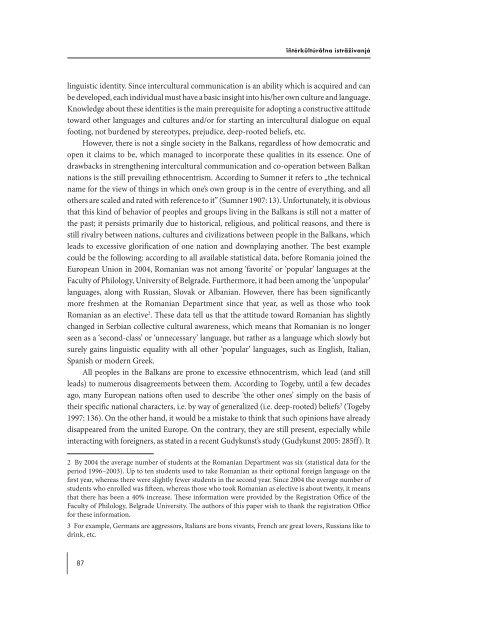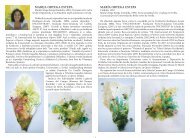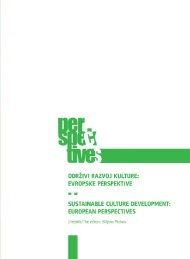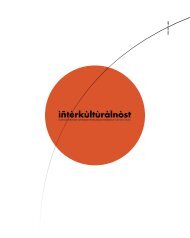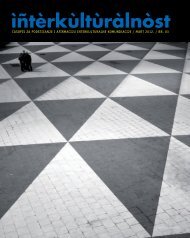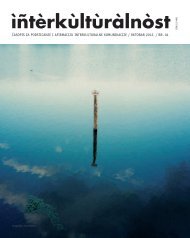Preuzmite kompletan Äasopis broj 2 u PDF formatu - Portal kulture ...
Preuzmite kompletan Äasopis broj 2 u PDF formatu - Portal kulture ...
Preuzmite kompletan Äasopis broj 2 u PDF formatu - Portal kulture ...
You also want an ePaper? Increase the reach of your titles
YUMPU automatically turns print PDFs into web optimized ePapers that Google loves.
ïñtérkûltúråłna ìsträživanjá<br />
linguistic identity. Since intercultural communication is an ability which is acquired and can<br />
be developed, each individual must have a basic insight into his/her own culture and language.<br />
Knowledge about these identities is the main prerequisite for adopting a constructive attitude<br />
toward other languages and cultures and/or for starting an intercultural dialogue on equal<br />
footing, not burdened by stereotypes, prejudice, deep-rooted beliefs, etc.<br />
However, there is not a single society in the Balkans, regardless of how democratic and<br />
open it claims to be, which managed to incorporate these qualities in its essence. One of<br />
drawbacks in strengthening intercultural communication and co-operation between Balkan<br />
nations is the still prevailing ethnocentrism. According to Sumner it refers to „the technical<br />
name for the view of things in which one’s own group is in the centre of everything, and all<br />
others are scaled and rated with reference to it” (Sumner 1907: 13). Unfortunately, it is obvious<br />
that this kind of behavior of peoples and groups living in the Balkans is still not a matter of<br />
the past; it persists primarily due to historical, religious, and political reasons, and there is<br />
still rivalry between nations, cultures and civilizations between people in the Balkans, which<br />
leads to excessive glorification of one nation and downplaying another. The best example<br />
could be the following: according to all available statistical data, before Romania joined the<br />
European Union in 2004, Romanian was not among ‘favorite’ or ‘popular’ languages at the<br />
Faculty of Philology, University of Belgrade. Furthermore, it had been among the ‘unpopular’<br />
languages, along with Russian, Slovak or Albanian. However, there has been significantly<br />
more freshmen at the Romanian Department since that year, as well as those who took<br />
Romanian as an elective 2 . These data tell us that the attitude toward Romanian has slightly<br />
changed in Serbian collective cultural awareness, which means that Romanian is no longer<br />
seen as a ‘second-class’ or ‘unnecessary’ language, but rather as a language which slowly but<br />
surely gains linguistic equality with all other ‘popular’ languages, such as English, Italian,<br />
Spanish or modern Greek.<br />
All peoples in the Balkans are prone to excessive ethnocentrism, which lead (and still<br />
leads) to numerous disagreements between them. According to Togeby, until a few decades<br />
ago, many European nations often used to describe ‘the other ones’ simply on the basis of<br />
their specific national characters, i.e. by way of generalized (i.e. deep-rooted) beliefs 3 (Togeby<br />
1997: 136). On the other hand, it would be a mistake to think that such opinions have already<br />
disappeared from the united Europe. On the contrary, they are still present, especially while<br />
interacting with foreigners, as stated in a recent Gudykunst’s study (Gudykunst 2005: 285ff). It<br />
2 By 2004 the average number of students at the Romanian Department was six (statistical data for the<br />
period 1996–2003). Up to ten students used to take Romanian as their optional foreign language on the<br />
first year, whereas there were slightly fewer students in the second year. Since 2004 the average number of<br />
students who enrolled was fifteen, whereas those who took Romanian as elective is about twenty, it means<br />
that there has been a 40% increase. These information were provided by the Registration Office of the<br />
Faculty of Philology, Belgrade University. The authors of this paper wish to thank the registration Office<br />
for these information.<br />
3 For example, Germans are aggressors, Italians are bons vivants, French are great lovers, Russians like to<br />
drink, etc.<br />
87


